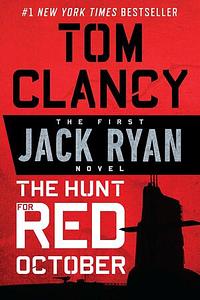You need to sign in or sign up before continuing.
Take a photo of a barcode or cover
adventurous
informative
tense
fast-paced
Plot or Character Driven:
Plot
Strong character development:
No
Loveable characters:
Yes
Diverse cast of characters:
No
Flaws of characters a main focus:
No
adventurous
challenging
dark
funny
mysterious
tense
slow-paced
Plot or Character Driven:
Plot
Strong character development:
No
Loveable characters:
No
Diverse cast of characters:
No
Flaws of characters a main focus:
No
This book was sold to me as a story about spies and politics as much as submarines. I'm not a fan of vehicles (not sure if that's the best way to describe it?? Cars, planes, boats etc all bore me to death) but intrigue is defo up my alley, so I gave it a go.
I was expecting to find it boring (and I definitely did for some parts) but to my surprise I did enjoy the story overall.
**SPOILER** Within the first few chapters I was gripped by the political officer's swift, brutal murder and the mind games that followed **/SPOILER**. The characters were engaging - I loved the moments focused on them and their interactions, especially when it was between the Russians and the Americans.
The constant Navy jargon and boat names were pretty painful. I'm sure he did explain what all of them were at some point in the book but it was pretty difficult to remember them all. Not to mention the the paragraphs upon paragraphs of orders to being given to the different crews, (which honestly sounded like random alternations of numbers and the words "left", "right", and "rudder" - I'm sure it made sense to Naval warfare fanatics, but it was impossible for me to visualise anything).
It did make me appreciate how insane submarines are though. It's amazing how we managed to create drivable underwater tubes and can navigate them with nothing but sonar. And I did really enjoy the brief moments explaining the supercomputers and tech being used.
My rating for this book is probably unfair. I don't really think I'm the target audience for it. However, I always rate books based on my enjoyment of them at the time - and although i did enjoy it overall, based on that criteria this book defo doesn't deserve a 4.
I was expecting to find it boring (and I definitely did for some parts) but to my surprise I did enjoy the story overall.
**SPOILER** Within the first few chapters I was gripped by the political officer's swift, brutal murder and the mind games that followed **/SPOILER**. The characters were engaging - I loved the moments focused on them and their interactions, especially when it was between the Russians and the Americans.
The constant Navy jargon and boat names were pretty painful. I'm sure he did explain what all of them were at some point in the book but it was pretty difficult to remember them all. Not to mention the the paragraphs upon paragraphs of orders to being given to the different crews, (which honestly sounded like random alternations of numbers and the words "left", "right", and "rudder" - I'm sure it made sense to Naval warfare fanatics, but it was impossible for me to visualise anything).
It did make me appreciate how insane submarines are though. It's amazing how we managed to create drivable underwater tubes and can navigate them with nothing but sonar. And I did really enjoy the brief moments explaining the supercomputers and tech being used.
My rating for this book is probably unfair. I don't really think I'm the target audience for it. However, I always rate books based on my enjoyment of them at the time - and although i did enjoy it overall, based on that criteria this book defo doesn't deserve a 4.
adventurous
tense
medium-paced
Plot or Character Driven:
Plot
Strong character development:
No
Loveable characters:
N/A
Diverse cast of characters:
No
Flaws of characters a main focus:
No
Reading any Tom Clancy book as a layperson is always a bit more difficult because of the heavy usage of military acronyms and language without footnotes or contextual clues.
In Hunt for Red October, Clancy is at his fighting weight so to speak. All of his trademark narrative devices are used with intent and sparingly, unlike his later books that are known to have issues with keeping to the main narrative. It's a solid read, if you're in the mood for a book version of the summer Hollywood Blockbuster.
In Hunt for Red October, Clancy is at his fighting weight so to speak. All of his trademark narrative devices are used with intent and sparingly, unlike his later books that are known to have issues with keeping to the main narrative. It's a solid read, if you're in the mood for a book version of the summer Hollywood Blockbuster.
Moderate: Cursing, Blood, Alcohol
Minor: Death, Gun violence, Medical content, Murder
Heavy look at propaganda and politics/political indoctrination, based per the cold war subject.
tense
medium-paced
Plot or Character Driven:
A mix
Strong character development:
No
Loveable characters:
Complicated
A few months ago I read [b:Writing the Thriller|2285306|Writing the Thriller|Trish Macdonald Skillman|https://i.gr-assets.com/images/S/compressed.photo.goodreads.com/books/1266699942l/2285306._SY75_.jpg|2291512] and this was one of the example books it cited, and that was my main reason for reading it, because most of the other examples were hard to find.
But if this was a thriller, it seemed to break all the rules of the genre, at least the rules given in that book, which implied that one must have a big threat to the protagonist right from the start, and tension which never lets up. I fudn the story moderately exciting, and moderately well told. perhaps I'd better go back to the book on writing thrillers to see what it said.
It seemed to belong to the sub-genre of techno thrillers, but if aimed at a general readership it would have helped to have the naval terminology explained in a glossary. Eventually I managed to work out that a "boomer" was a missile-carrying nuclear-powered submarine, and for a while I thought an oiler was a diesel-powered submarine, but it turned out to be something else, I'm not sure what. Some of the terms were explained the first time they appeared, but when they next appeared, 100 or more pages later, I'd forgotten what they meant.
But if this was a thriller, it seemed to break all the rules of the genre, at least the rules given in that book, which implied that one must have a big threat to the protagonist right from the start, and tension which never lets up. I fudn the story moderately exciting, and moderately well told. perhaps I'd better go back to the book on writing thrillers to see what it said.
It seemed to belong to the sub-genre of techno thrillers, but if aimed at a general readership it would have helped to have the naval terminology explained in a glossary. Eventually I managed to work out that a "boomer" was a missile-carrying nuclear-powered submarine, and for a while I thought an oiler was a diesel-powered submarine, but it turned out to be something else, I'm not sure what. Some of the terms were explained the first time they appeared, but when they next appeared, 100 or more pages later, I'd forgotten what they meant.
Hear me out?
Apple https://bit.ly/HFRObook
Spotify https://bit.ly/HFROnovel
Stitcher https://bit.ly/HFROstitch
Apple https://bit.ly/HFRObook
Spotify https://bit.ly/HFROnovel
Stitcher https://bit.ly/HFROstitch
Book Rating: 4/10:
Oh man, I've wanted to read Tom Clancy for years. But never got around to it and I wish that was still the case.
While I appreciate the amount of research into the technical aspects of this novel. I just felt it was too much and it came at the cost of the story. I wanted a cold war thriller and got a cold war submarine manual instead. The characters are all one dimensional and the story itself is wafer-thin and a bit too long for my liking. I think the last fifty or so pages could have been cut and I think it would have helped the novel greatly.
I'm gutted because I really wanted to get into Tom Clancy’s work. I'm told this is one of his better novels and they go downhill in the ‘90s. Well, if this is one of his best then I think I'm just going to avoid his work from now on and accept Tom Clancy isn't for me.
Oh man, I've wanted to read Tom Clancy for years. But never got around to it and I wish that was still the case.
While I appreciate the amount of research into the technical aspects of this novel. I just felt it was too much and it came at the cost of the story. I wanted a cold war thriller and got a cold war submarine manual instead. The characters are all one dimensional and the story itself is wafer-thin and a bit too long for my liking. I think the last fifty or so pages could have been cut and I think it would have helped the novel greatly.
I'm gutted because I really wanted to get into Tom Clancy’s work. I'm told this is one of his better novels and they go downhill in the ‘90s. Well, if this is one of his best then I think I'm just going to avoid his work from now on and accept Tom Clancy isn't for me.





